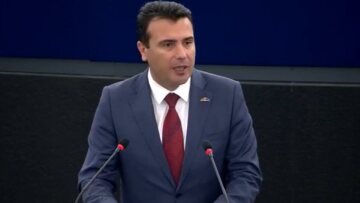
They know not what they are doing while the Troika and Eurostat are on their way
They know not what they are doing while the Troika and Eurostat are on their way
It seems that the government’s financial policy is moving in murky waters, without purpose and direction. After the series of missed opportunities in the first 18 months in office, it is now erasing any good impression it may have created during the last twelve months.
UPD:
It seems that the government’s financial policy is moving in murky
waters, without purpose and direction. After the series of missed
opportunities in the first 18 months in office, it is now erasing any
good impression it may have created during the last twelve months.
Just yesterday, Finance minister Giorgos Papakonstantinou did not avoid falling into the “cacophony” trap, as he himself has called the recent statements made by Kostas Simitis, Wolfgang Schäuble, Olli Rehn and all those who initiated the restructure debate.
Papakonstantinou’s “blunder”
And ignoring the fact that among the Greek reporters to whom he was talking there were correspondents of foreign media networks which are raging about the debt and the fate of Greece, not only did he not confirm previous estimates that the country will return to the markets for loans within 2011, not only did he not limit himself to what is envisaged in the memorandum on the issue of government bonds in 2012, but also he entered a theoretical debate about the hypothetical question of what will eventually happen if the country is not able to find reasonable rates at which to borrow until then.
Thus, he added to a debate of concern for investors and lenders, leading to questions and comments that remain unanswered, such as what form the potential help from EFSF will ultimately take (2013 onwards), with what conditions and rewards it will be given, what will happen if we receive a negative answer from governments of countries such as Slovakia and Finland, which have elections but is likely to say “no” even to Portugal if it requests its support…
He didn’t even follow Strauss-Kahn’s example (on Saturday), nor that of the representative of the European Commission, Chantal Hughes (on Tuesday), who amidst the deluge of persistent questions from journalists about Greece, ostentatiously replayed their usual "tape” and both concluded with a “fullstop”.
Just yesterday, Finance minister Giorgos Papakonstantinou did not avoid falling into the “cacophony” trap, as he himself has called the recent statements made by Kostas Simitis, Wolfgang Schäuble, Olli Rehn and all those who initiated the restructure debate.
Papakonstantinou’s “blunder”
And ignoring the fact that among the Greek reporters to whom he was talking there were correspondents of foreign media networks which are raging about the debt and the fate of Greece, not only did he not confirm previous estimates that the country will return to the markets for loans within 2011, not only did he not limit himself to what is envisaged in the memorandum on the issue of government bonds in 2012, but also he entered a theoretical debate about the hypothetical question of what will eventually happen if the country is not able to find reasonable rates at which to borrow until then.
Thus, he added to a debate of concern for investors and lenders, leading to questions and comments that remain unanswered, such as what form the potential help from EFSF will ultimately take (2013 onwards), with what conditions and rewards it will be given, what will happen if we receive a negative answer from governments of countries such as Slovakia and Finland, which have elections but is likely to say “no” even to Portugal if it requests its support…
He didn’t even follow Strauss-Kahn’s example (on Saturday), nor that of the representative of the European Commission, Chantal Hughes (on Tuesday), who amidst the deluge of persistent questions from journalists about Greece, ostentatiously replayed their usual "tape” and both concluded with a “fullstop”.
Εurostat and the Troika are coming
However, Eurostat’s 2010 deficit revision on Tuesday will be added to all these uncertainties. In this case, another 2,5-3 billion euros will be added to the nearly 2 billion of the “black hole” that opened up at the beginning of the year.
At the beginning of May, the government will receive the Troika team for the last audit regarding the 6th installment, with which it will make the final assessment of all the negative developments, including a plan to reverse them.
UPD:
Ακολουθήστε το protothema.gr στο Google News και μάθετε πρώτοι όλες τις ειδήσεις
Δείτε όλες τις τελευταίες Ειδήσεις από την Ελλάδα και τον Κόσμο, τη στιγμή που συμβαίνουν, στο Protothema.gr
Δείτε όλες τις τελευταίες Ειδήσεις από την Ελλάδα και τον Κόσμο, τη στιγμή που συμβαίνουν, στο Protothema.gr
ΡΟΗ ΕΙΔΗΣΕΩΝ
Ειδήσεις
Δημοφιλή
Σχολιασμένα








































